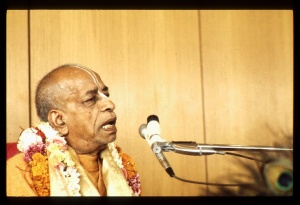CC Adi 10.35

A.C. Bhaktivedanta Swami Prabhupada
TEXT 35
- śrī-nṛsiṁha-upāsaka—pradyumna brahmacārī
- prabhu tāṅra nāma kailā ‘nṛsiṁhānanda’ kari’
SYNONYMS
śrī-nṛsiṁha-upāsaka — the worshiper of Lord Nṛsiṁhadeva; pradyumna brahmacārī — Pradyumna Brahmacārī; prabhu — the Lord; tāṅra — his; nāma — name; kailā — turned into; nṛsiṁhānanda — Nṛsiṁhānanda; kari’ — by such a name.
TRANSLATION
The thirteenth branch was Pradyumna Brahmacārī. Since he was a worshiper of Lord Nṛsiṁhadeva, Śrī Caitanya Mahāprabhu changed his name to Nṛsiṁhānanda Brahmacārī.
PURPORT
Pradyumna Brahmacārī is described in the Antya-līlā, Second Chapter, of Śrī Caitanya-caritāmṛta. He was a great devotee of Lord Caitanya, who changed his name to Nṛsiṁhānanda. While coming from the house of Rāghava Paṇḍita at Pānihāṭi to the house of Śivānanda, Lord Caitanya Mahāprabhu appeared in the heart of Nṛsiṁhānanda Brahmacārī. To acknowledge this, Nṛsiṁhānanda Brahmacārī used to accept as eatables the food of three Deities, namely Jagannātha, Nṛsiṁhadeva and Lord Caitanya Mahāprabhu. This is stated in the Caitanya-caritāmṛta, Antya-līlā, Second Chapter, verses 48 through 78. Upon receiving information that Lord Caitanya Mahāprabhu was proceeding toward Vṛndāvana from Kuliyā, Nṛsiṁhānanda absorbed himself in meditation and by his mental activities began constructing a very nice road from Kuliyā to Vṛndāvana. All of a sudden, however, he broke his meditation and told the other devotees that this time Lord Caitanya Mahāprabhu would not go to Vṛndāvana but would travel only as far as the place known as Kānāi Nāṭaśālā. This is described in Madhya-līlā, Chapter One, verses 155 through 162. The Gaura-gaṇoddeśa-dīpikā (74) says, āveśaś ca tathājñeyo miśre pradyumna-saṁjñake: Śrī Caitanya Mahāprabhu changed the name of Pradyumna Miśra, or Pradyumna Brahmacārī, to Nṛsiṁhānanda Brahmacārī, for in his heart Lord Nṛsiṁhadeva was manifest. It is said that Lord Nṛsiṁhadeva used to talk with him directly.